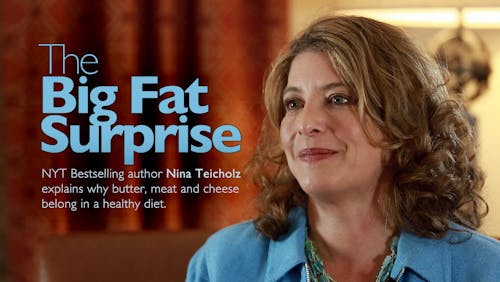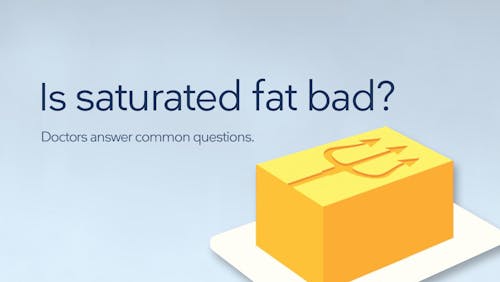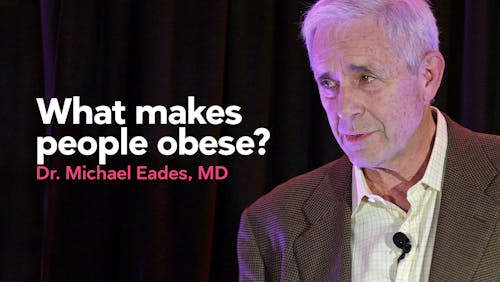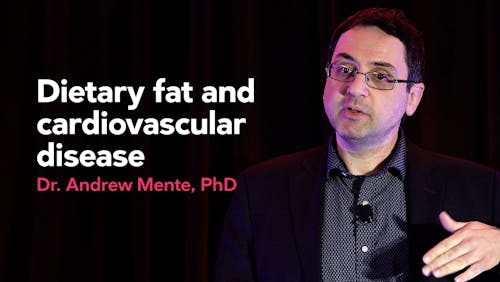Potential health effects of a saturated fat tax are highly speculative

Should certain foods be taxed in order to discourage people from consuming them, theoretically reducing disease risk?
Some would argue that such taxes are never a good idea, even in the case of foods universally considered unhealthy, like sugar-sweetened beverages.
However, taxing a nutrient for which there is no convincing evidence of harm is even more difficult to support.
Yet this is what a group of European public health researchers are proposing, and the nutrient in question is saturated fat:
We recently reported on a paper by an international group of researchers urging the World Health Organization’s (WHO) to reconsider its draft proposal recommending saturated fat be restricted to less than 10% of daily calories. And last fall we discussed why a tax on red meat is a bad idea.
Back in 2011, Denmark passed a law taxing foods high in saturated fat. The tax was apparently effective in reducing saturated fat intake among Danish consumers, which reportedly dropped by about 4% during the time it was in place. It was repealed just over a year later for economic and political reasons, before any health impacts of the tax could be evaluated.
In this new paper, researchers deduced that a saturated fat tax in seven European countries would lead to similar reductions in saturated fat intake and increases in polyunsaturated fatty acids (PUFA) intake. They created a model for potential changes in heart disease risk over 10 years’ time, comparing the results expected if foods high in saturated fat were taxed to the results expected if no tax was enacted and saturated fat intake remained at current levels.
Their conclusion? A tax that resulted in every person achieving WHO saturated fat intake guidelines and increasing PUFA intake could prevent 11% to nearly 30% of heart disease cases, depending on one’s gender and country of residence.
We feel this is extremely speculative and that the tax itself is wrong for several reasons:
- There is no convincing evidence that replacing saturated fat with PUFA reduces risk. Although some observational studies suggest a very weak link between high saturated fat intake and heart disease, it’s important to keep in mind that observational data can’t prove whether a behavior (such as eating a lot of saturated fat) causes an outcome (such as higher rates of heart disease). Also, correlations between the two must be very strong to even suggest that a legitimate risk exists. Indeed, most clinical trials (much stronger evidence) haven’t shown any benefit of replacing saturated fat with PUFA — and some have actually shown a slightly increased risk of heart disease.1
- Saturated fat is found in many healthy foods. Full-fat dairy, meat, and butter have been part of our ancestral diet for thousands of years. Taxing these nutritious, satisfying foods simply because they are high in saturated fat doesn’t make much sense from a health standpoint.
- PUFA are a diverse group. Interestingly, the researchers stated that “a saturated fat decrease without a simultaneous increase in PUFA does not seem to be beneficial for health.” However, there are different types of PUFA, and consuming more of them isn’t always better. Although increasing omega-3 PUFA intake by eating fatty fish a few times a week is considered a smart nutritional move, the great majority of PUFA we consume belong to the omega-6 family. Most of us already get far more omega-6 PUFA than we need, resulting in a less-than-ideal omega-6:omega-3 ratio. A tax on saturated fat might very well prompt people to consume more highly processed vegetable oils, which are among the top omega-6 PUFA sources.
- People with lower incomes would fare the worst. During the period that Denmark’s saturated fat tax was in effect, the average price of butter increased by more than 20%. For people struggling to get by, switching to margarine and vegetable oils would seem logical, especially if they’ve been told butter is being taxed because it’s less healthy. High-quality protein sources like meat and dairy might be replaced by lower-cost, processed foods for the same reason.
At Diet Doctor, we strongly believe that eating nutritious real food, including those rich in saturated fat, is beneficial for health. Although these researchers may have good intentions, we feel that they are making unsupported assumptions about what a saturated fat tax would accomplish. We disagree that taxing real foods will help reduce heart disease, especially when such foods are likely to be replaced by processed, lower-quality products that escape the tax.


A user guide to saturated fat
Guide This guide explains what is known about saturated fat, discusses the scientific evidence about its role in health, and explores whether we should be concerned about how much we eat it.
Earlier
Another thoughtful analysis upends fear of saturated fat
Old news is new again – dairy fat is beneficial for our health
Fat
British Medical Journal 2016: Re-evaluation of the traditional diet-heart hypothesis: analysis of recovered data from Minnesota Coronary Experiment (1968-73) [systematic review of randomized trials; strong evidence]
British Medical Journal 2013: Use of dietary linoleic acid for secondary prevention of coronary heart disease and death: evaluation of recovered data from the Sydney Diet Heart Study and updated meta-analysis [systematic review of randomized trials; strong evidence] ↩








